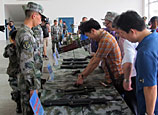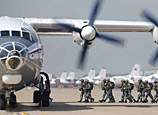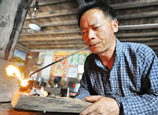
BEIJING, Aug.1 (Xinhuanet) -- On the 122nd anniversary of Swiss National Day, Salome Meyer, Charge d'Affaires of the Swiss Embassy in Beijing, talked about the country and its ties with China in an interview with China Daily.
Since 1891, Aug 1 has been celebrated as Swiss National Day. The date marks the founding of the mediaeval Swiss Confederation by the three cantons of Uri, Schwyz and Unterwalden on that date in 1291, Meyer said.
Men from the three cantons swore eternal allegiance to one another, promising mutual help and assistance.
The alliance was mainly formed to oppose the Habsburgs, who were striving to strengthen their position in the strategic region.
The Swiss have a reputation as hard working, pragmatic and innovative people, said the charge d'affaires, noting "we share these characteristics with the Chinese people".
Switzerland was one of the first Western countries to recognize the New China when they established official diplomatic relations in January 1950.
Over the years, relations between the two countries have been strengthened and the cooperation has deepened and expanded in a vast array of areas.
In 2007, Switzerland was also among the first countries to recognize China as a full market economy.
Today China is the largest economic partner for Switzerland in Asia and its third-biggest in the world following the United States and the European Union.
And in that bilateral trade, non-EU member Switzerland has maintained a balance sheet in its favor for many years.
According to Chinese statistics, trade volume between China and Switzerland reached $26.31 billion in 2012 and $22.89 billion in the first five months of this year.
The highlight of 2013 has been signing of a free trade agreement between the two countries.
"This agreement was concluded after only two years and nine rounds of negotiations and will bring significant improvements for both partners," said the charge d'affaires.
The FTA deal covers goods and services as well as environmental protection, employment, intellectual property and market competition.
According to the FTA, both parties agree to lower tariffs - sometimes to zero - on the majority of products to further encourage trade.
"The agreement will boost the bilateral trade and investment and will be beneficial for bilateral relations as a whole," said Meyer.
Education, culture and innovation are particular fields of cooperation, she said.
"Beyond the interstate exchanges, increased activity on a personal level, the people-to-people contact, will grow," she added.
The number of Chinese visitors to Switzerland surpassed 600,000 in 2012, a new record high.
And there is also a sharp rise in high-level visits from both countries. Chinese Premier Li Keqiang visited Switzerland in May as his first European destination after he took office in March.
China has been the destination for four out of seven of Switzerland's ministers. Last month Swiss President Ueli Maurer visited China to meet President Xi Jinping and Premier Li.
"And we are expecting further ministerial and high-level visits in the second half of this year," said the diplomat.
"So many Swiss ministers have never traveled to China within one year only."
















 Man commits suicide, rescued by his wife in NE China
Man commits suicide, rescued by his wife in NE China


![]()
